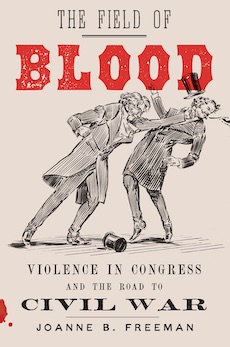Shortlisted for the 2019 Ralph Waldo Emerson Award
By Allen D. Boyer
In an era that laments a lost golden age of civil politics, this book is a brilliant, hair-raising reminder that American political divisions have been sharper than we often recall, that politicians have been more churlish, and—disquietingly—that disputes have been deadlier. Between 1830 and 1860, Joanne B. Freeman finds, there were more than 70 violent encounters in which congressmen and senators took a hand: “canings, duel negotiations, and duels; shoving and fistfights; brandished pistols and bowie knives; wild melees in the House; and street fights with fists and the occasional brick.”
Washington was the capital of the American republic. It was also a Southern city, where planter politicians felt at ease defending slavery, and a fast-growing, rough-edged place, unruly as a frontier boomtown. Congressmen worked in a windowless chamber, hot and crowded, reeking of tobacco chaw and basement sewage. Some came in drunk; many carried weapons. All had the drive and the vanity of politicians, and they were willing to fight.
Franklin Pierce and two other young congressmen, at a theatre one night, were caught up in a scrape featuring fisticuffs and a brandished pistol. Henry Wise of Virginia, a testy Whig who could spit tobacco fifteen feet, bullied Northerners and Southerners alike, and started “the great fight” of 1841 on the floor of the House. The nascent Republican party featured towering Midwesterners and hot-tempered former Know-Nothings. Joshua Giddings of Ohio goaded Southerners as “an antislavery toreador, waving the red flag of abolitionism in front of roaring slaveholders.” Freeman concludes:
“Party loyalties pulled [congressmen] into fighting; concern for manhood pushed them into fighting; the community of Congress sanctioned fighting; and holding one’s own before a hometown audience sometimes seemed to require it. . . . Not only did Congress endorse fighting, but by reelecting combatants, the nation did the same, encouraging their representatives to literally fight for their rights.”
It is well known how Congressman Preston Brooks of South Carolina broke his cane over the head of Senator Charles Sumner of Massachusetts, on the Senate floor. More notorious, Freeman suggests, was the duel of 1838 between two congressmen, Jonathan Cilley of Maine and Henry Graves of Kentucky. The affair was a shoot-out, in every sense, between Whigs and Democrats. On a cold Saturday afternoon, on a dueling pitch almost the length of a football field, the two representatives traded fire with Kentucky rifles—missing and misfiring and having their rifles loaded again, until Cilley fell, fatally wounded. The House of Representatives investigated, produced three conflicting reports, and punished no one.
Antebellum newspapers used genteel terms for such violence. A tense shoving match might be reported as “confusion,” “crowding,” or the exchange of “some mutual explanations.” Freeman decodes such euphemisms with the skill of a semiotician, and she pursues facts with the grit of a detective: “The Field of Blood” boasts a hundred pages of endnotes.
Freeman draws on the diary of Benjamin Brown French, a Washington insider and veteran Congressional clerk. Born in New Hampshire, French came to the capital as a genial Democrat, ready to make common cause with allies from the Deep South. Over the decades, he grew estranged from “the Slave Power.” Before the election of 1860, French bought a pocket pistol in case he was threatened by Southerners on the streets of Washington. In the same weeks, South Carolina senator James Henry Hammond bought his own revolver, convinced that Republicans might provoke a conflict in the Capitol itself.
Freeman concludes that antebellum congressmen “threatened, feared, and sometimes even expected disunion, [but] did not see war as inevitable. . . . The contingencies of the moment fueled their fires.” And yet, telling themselves they would fight only in self-defense, the politicians moved in unwitting lockstep toward civil war. Each party chose to distrust the other—chose to credit the other side’s most inflammatory words. They convinced themselves to take up arms. That is the timeliest, most troubling lesson of this history.
Allen D. Boyer (ΦBK, Vanderbilt University, 1977), a lawyer and writer in New York City, is the author of Sir Edward Coke and the Elizabethan Age. He is currently at work on a history of the law of treason in England. Vanderbilt University is home to the Alpha of Tennessee Chapter of Phi Beta Kappa.




